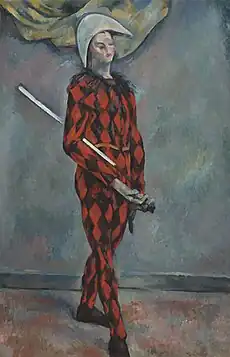harlequin
English

Etymology
From earlier Harlicken, from Middle French Harlequin (in Italian Arlecchino, the name of a popular servant character in commedia dell'arte plays), from Old French Harlequin, Halequin, Herlequin, Hellequin, Hierlekin, Hellekin (a demon, malevolent spirit), probably of Germanic origin, connected to the Old English figure of Herla Cyning (“King Herla”, a mythical figure identified with Woden) or possibly to Old Frisian helle kin, Old English helle cyn, Old Norse heljar kyn (“the kindred of Hell”). Related to Middle English Hurlewain (“a mischievous sprite or goblin”).
Pronunciation
Noun
harlequin (countable and uncountable, plural harlequins)
- A pantomime fool, typically dressed in colorful checkered clothes.
- 1749, Henry Fielding, The History of Tom Jones, a Foundling:
- […] were certainly the worst and dullest company into which an audience was ever introduced; and (which was a secret known to few) were actually intended so to be, in order to contrast the comic part of the entertainment, and to display the tricks of harlequin to the better advantage.
- 1831, L[etitia] E[lizabeth] L[andon], chapter XX, in Romance and Reality. […], volume I, London: Henry Colburn and Richard Bentley, […], →OCLC, page 241:
- Motives are like harlequins—there is always a second dress beneath their first.
- A greenish-chartreuse color.
- harlequin:
- (informal) A harlequin duck.
- (entomology) Any of various riodinid butterflies of the genera Taxila and Praetaxila.
Usage notes
- Because of its origin in the name of an Italian theatrical character, Harlequin is often used as a proper noun.
Derived terms
Translations
|
Adjective
harlequin (not comparable)
Derived terms
- harlequinade
- harlequin bat
- harlequin beetle
- harlequin cabbage bug
- harlequin caterpillar
- harlequin duck
- harlequinery
- harlequinesque
- harlequin ice cream
- harlequin moth
- harlequin opal
- harlequin snake
- yellow harlequin
Translations
|
Verb
harlequin (third-person singular simple present harlequins, present participle harlequining, simple past and past participle harlequined)